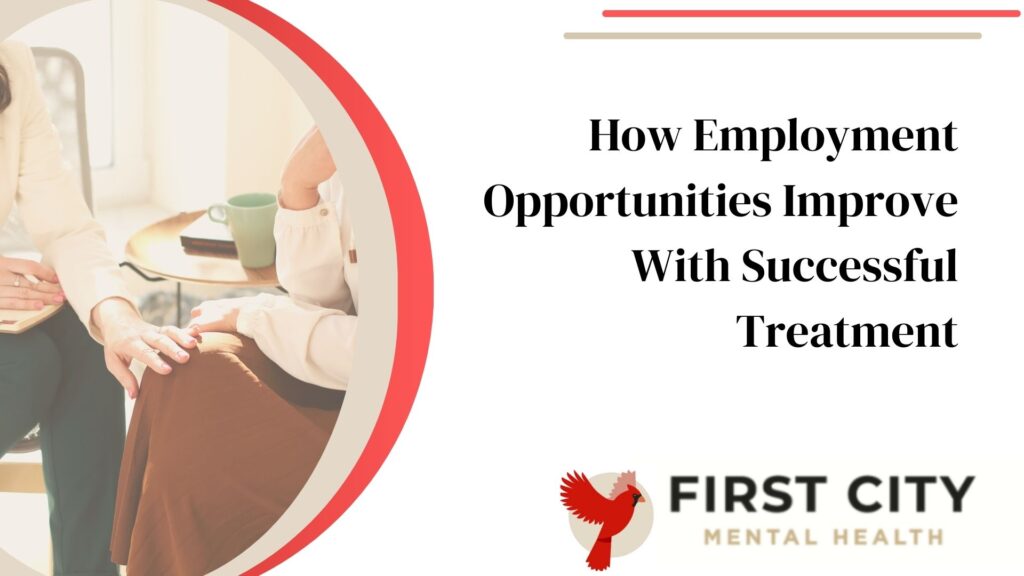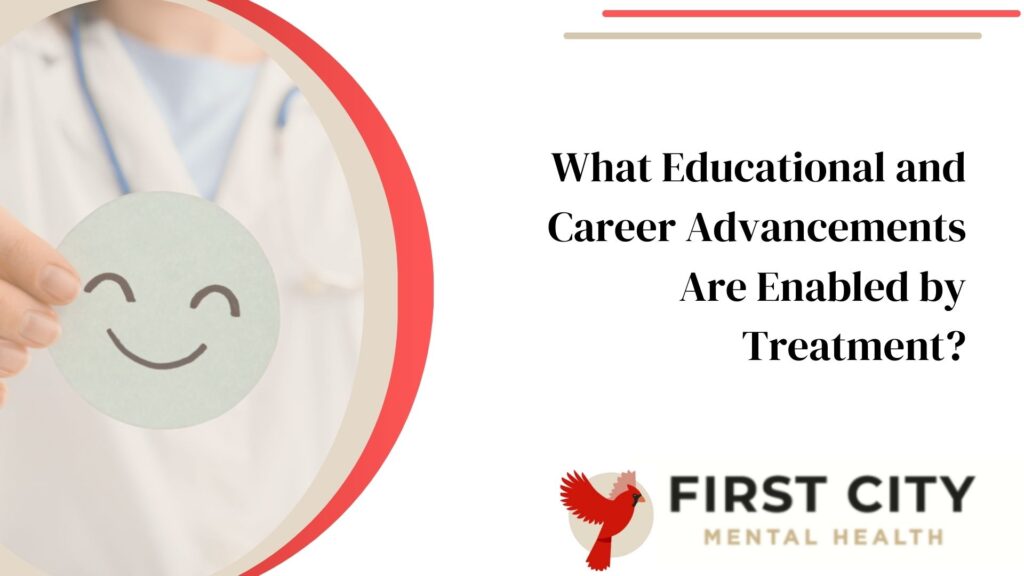
Why Choose The Anxiety Disorder Treatment for Long-Term Relief
January 20, 2025
What Role Does Psychoeducation Play in Co-Occurring Disorders Treatment?
January 20, 2025Treating co-occurring disorders presents a complex challenge, yet it yields long-term benefits that can significantly improve an individual’s quality of life. Addressing both mental health issues and substance use disorders simultaneously, co-occurring disorders treatment is designed to foster recovery on multiple fronts.
By integrating therapies targeting each condition’s intricacies, individuals are more likely to achieve lasting stability, reduced relapse rates, and enhanced overall wellbeing. This comprehensive approach addresses immediate health concerns such as to treat co occurring disorders and mental illness and lays the groundwork for sustained recovery and a path toward a healthier future.
Key Takeaways
- Seeking treatment for co-occurring mental disorders significantly improves the overall quality of life, impacting both mental and physical health positively in the long term. This holistic improvement is crucial to a healthier, more balanced life.
- Comprehensive care leads to notable psychological benefits, including reduced symptoms of mental health disorders and improved emotional wellbeing, which are essential for a fulfilling life.
- Enhanced employment opportunities post-treatment highlight the importance of addressing co-occurring disorders for personal health, economic stability, and professional growth.
What Can Improved Quality of Life Be Expected After Co-occurring Disorders Treatment?
Successful co-occurring disorders treatment in Kokomo, Indiana, often significantly improves a patient’s quality of life. These mental and physical improvements address the complexities of dual diagnosis. Patients typically experience reduced symptoms of both mental health issues and substance abuse, leading to a more stable and fulfilling life.
One key outcome is improved mental health stability. This includes fewer episodes of depression, anxiety, or other mental health conditions. It also means better management of emotions and thoughts. Such stability is crucial for daily functioning and maintaining relationships.
Another outcome is increased physical health. Substance abuse takes a toll on the body. After treatment, patients often report better sleep patterns, more energy, and fewer physical health problems related to substance use. This physical recovery is vital for overall wellbeing.
Social relationships improve as well. With clearer thinking and reduced substance use, individuals can rebuild damaged relationships and form new, healthy ones. They become more present in their interactions and can engage in social activities they once avoided.
Employment opportunities may also expand after treatment. Improved mental and physical health allows individuals to pursue jobs or education they previously could not manage. This can lead to financial stability and a sense of purpose.
In regions like Kokomo, Indiana, where co-occurring disorders treatment programs are accessible, these outcomes are not just theoretical but real possibilities for many individuals seeking help.
How Does Treatment Impact Physical Health Long-Term?

Treatment for co-occurring disorders is crucial in enhancing physical health over time. It addresses not only the psychological aspects but also the physical repercussions of these conditions. Individuals undergoing comprehensive treatment experience significant improvements in their overall health, reducing the risk of chronic diseases associated with substance abuse and mental health issues.
One notable impact is on the cardiovascular system. Substance abuse can severely damage heart health, leading to increased risks of heart attack and stroke. Effective treatment reduces these risks by promoting a healthier lifestyle and mitigating the effects of substances on the body. Patients report better blood pressure control and improved heart function as they progress through their recovery journey.
Another critical area is liver health. The liver can suffer immense damage from prolonged substance abuse, risking cirrhosis or liver failure. Co-occurring disorders treatment often includes medical interventions that support liver recovery alongside strategies to maintain sobriety. This dual approach significantly lowers the likelihood of severe liver conditions developing in the future.
Moreover, treatment has a positive effect on the immune system. Substance abuse and mental health issues can weaken the body’s defense mechanisms, making individuals more susceptible to infections and diseases. Through comprehensive care, patients see an enhanced immune response, contributing to better overall health and reduced incidence of illness.
What Psychological Benefits Arise From Comprehensive Care?
Integrated treatment for co-occurring disorders addresses both mental health and substance use issues simultaneously. This approach has shown significant psychological benefits. Patients often experience a reduction in symptoms of both conditions. They report feeling more in control of their lives. This sense of empowerment is crucial for long-term recovery.
One key benefit is improved mental health stability. Patients learn coping strategies that are effective for both disorders. They become more resilient to stressors that could trigger relapse. Another advantage is enhanced self-awareness. Individuals gain insights into their behaviors and thought patterns. They understand the impact of substance use on their mental health.
Social relationships tend to improve as well. Practical communication skills are taught, helping patients rebuild broken bonds with family and friends. They feel less isolated, which is vital for emotional support.
Finally, integrated treatment fosters hope. Patients see real progress as they work on both aspects of their condition. This positive outlook encourages them to stay engaged in treatment and pursue a healthier lifestyle.
In contrast to traditional methods that treat disorders separately, integrated care offers a more holistic recovery pathway. It acknowledges the intricate relationship between mental health and substance abuse, providing a tailored treatment plan that addresses the unique needs of each individual.
How Employment Opportunities Improve With Successful Treatment

Successful treatment for co-occurring disorders significantly enhances an individual’s employability. It restores cognitive functions and stabilizes moods, which are crucial for maintaining a job. Employers seek reliable, focused workers. The treatment delivers these qualities.
Patients often struggle with daily tasks before treatment. Post-treatment, their improved mental health translates into better job performance. They manage stress effectively and communicate more clearly. These changes make them more attractive to employers.
Moreover, successful treatment can break the cycle of unemployment common among those with co-occurring disorders. By addressing both mental health and substance use issues, individuals gain a stronger foundation for entering the workforce. They become capable of adhering to schedules and meeting expectations, critical factors in sustaining employment.
Treatment programs include vocational training as part of recovery. This training equips patients with new skills or improves existing ones, making them more competitive in the job market. It also boosts their confidence, encouraging them to seek higher-quality positions they might have thought beyond their reach before.
What Social Relationships Enhancements Occur After Dual Diagnosis Treatment?
Following successful treatment at co-occurring disorders treatment centers, individuals often experience significant improvements in their social relationships. This enhancement is crucial for maintaining long-term recovery and overall wellbeing. One of the most notable changes is an increase in trust. When individuals commit to recovery, their actions align more closely with their words, rebuilding trust that past behaviors may have damaged.
Improved communication skills are another critical benefit. Treatment programs emphasize the importance of clear and honest communication, expressing one’s own needs, and listening to others. This can lead to deeper, more meaningful connections with family and friends. Individuals learn to express themselves more effectively and navigate conflicts without resorting to substance use or other harmful behaviors.
There has also been a noticeable expansion in social networks. Many find new friendships within support groups or among peers who share similar recovery journeys. These relationships provide a critical sense of belonging and support during challenging times. They learn to engage in social activities not involving substance use, opening up new avenues for enjoyment and fulfillment.
The ability to form healthier relationships extends beyond personal life into professional settings. As noted in the previous section, employment opportunities improve with successful treatment. The skills gained from improving social relationships contribute to this success by enhancing teamwork, communication, and reliability in the workplace.
The journey through dual diagnosis treatment fosters a transformation that touches every aspect of an individual’s life. It rebuilds broken bridges and paves the way for new connections that enrich the person’s world, making every step towards recovery a step towards a fuller, more connected life.
Why Long-Term Sobriety Rates Increase With Integrated Treatment
Integrated aid for adult co-occurring disorders treatment addresses both substance abuse and mental health conditions simultaneously. This approach is pivotal in increasing long-term sobriety rates. It recognizes the intricate link between mental health issues and substance use disorders. Patients often use substances as a way to self-medicate psychiatric symptoms, leading to a cycle of dependency and mental health deterioration.
One key reason for the success of integrated treatment is its holistic view of patient care. It combines psychiatric therapy with substance abuse treatment, offering a comprehensive solution. This method ensures that the root causes of substance use are addressed alongside the symptoms of mental health conditions. Patients receive tailored care that meets their specific needs, improving overall outcomes.
Furthermore, integrated treatment programs emphasize continuous support and relapse prevention strategies. They equip patients with coping mechanisms to deal with stress and triggers without turning to substance use. Skills such as emotional regulation, stress management, and problem-solving are central to maintaining sobriety in the long term.
Enhancing social relationships, as discussed previously, complements this approach by providing a supportive network. This network is crucial for recovery, offering encouragement and understanding from those who have faced similar challenges. The combination of professional medical treatment with community support creates a robust framework for sustained recovery.
How Treatment Reduces Recidivism in Co-Occurring Disorders
Treatment for co-occurring disorders targets both mental health and substance use issues simultaneously. This approach is crucial because these conditions often fuel each other, creating a cycle that’s hard to break. By addressing both, treatment can more effectively reduce the chances of a relapse into criminal behavior or substance use.
Integrated treatment plans are tailored to individual needs, combining medication management, therapy, and support groups. This comprehensive care ensures that underlying mental health conditions are treated alongside addiction. It is this holistic approach that significantly lowers the risk of recidivism. Patients learn coping strategies for managing their mental health, reducing the likelihood of turning to substance abuse as a form of self-medication.
Moreover, these treatment programs often include life skills training. This aspect is vital for helping individuals rebuild their lives post-treatment. They gain employment skills, financial management advice, and social support networks. These tools empower them to make positive life changes that support long-term recovery and decrease the chances of re-offending or falling back into old patterns.
Research shows that individuals who receive integrated treatment for co-occurring disorders are less likely to experience legal issues again compared to those who receive non-integrated treatment. This evidence highlights the effectiveness of such programs in breaking the cycle of addiction and criminality.
By providing comprehensive care that addresses both the symptoms and root causes of co-occurring disorders, treatment significantly contributes to reducing recidivism rates. It not only helps individuals recover from addiction but also equips them with the necessary skills to lead productive, fulfilling lives free from crime and substance abuse.
What Educational and Career Advancements Are Enabled by Treatment?

Successful treatment of co-occurring disorders significantly enhances an individual’s ability to pursue educational and career goals. This is because the treatment program not only addresses the mental health and substance use issues but also often includes support for developing life skills, setting realistic goals, and improving cognitive functions impaired by substance abuse or mental health conditions.
Individuals in recovery find that their focus and memory improve, making it easier to learn new information and skills. This cognitive improvement is crucial for both academic success and on-the-job performance. As a result, patients who have gone through a co-occurring disorders treatment program are better equipped to enroll in educational courses, succeed in obtaining degrees or certifications, and secure employment.
Moreover, these programs frequently incorporate vocational training and education as part of the rehabilitation process. They provide resources such as resume writing workshops, interview preparation sessions, and sometimes even direct job placement services. This holistic approach ensures that individuals are not only recovering from their disorders but are also being prepared for a successful reintegration into society.
The confidence gained from overcoming the challenges associated with co-occurring disorders often translates into ambition and motivation in the academic and professional arenas. Patients report feeling more capable of setting and achieving goals, which is a significant turnaround from the hopelessness that often accompanies these conditions.
Closing Thoughts
A comprehensive co-occurring disorders treatment program offers a transformative path, not only addressing the immediate health concerns but also paving the way for a more fulfilling life. Individuals benefit from improved physical health, psychological wellbeing, and enhanced social relationships.
The ripple effects extend to greater employment opportunities and educational advancements, underscoring the profound impact of integrated care. Importantly, this approach significantly contributes to long-term sobriety and reduces recidivism, highlighting the importance of addressing both mental health and substance use disorders in tandem.






